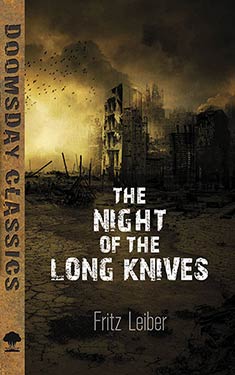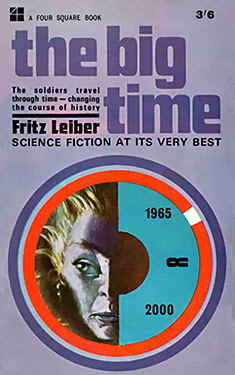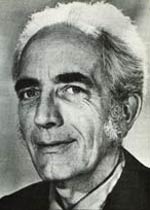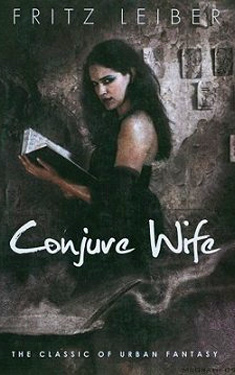“The End is Here!” Courtesy of Dover Books
 Dover Books has begun a new series of reprints called Doomsday Classics. Not the cheeriest series, perhaps, but they are pulling together a group of titles from the past 150 years that promises to combine academic interest with popular appeal for a broader science fiction readership. So far they have brought back into print Darkness and Dawn, a trilogy of novels from 1914 by George Allen England. England is largely forgotten today, but at the turn of the 20th century he was considered the American H.G. Wells. Also already on the shelves is Jack London’s The Scarlet Plague (1912). Coming up is Robertson Jeffries After London, a piece of Victorian science fiction new to me. Japan Sinks (1995) by Sakyo Komatsu is major work of Asian science fiction currently out-of-print in English.
Dover Books has begun a new series of reprints called Doomsday Classics. Not the cheeriest series, perhaps, but they are pulling together a group of titles from the past 150 years that promises to combine academic interest with popular appeal for a broader science fiction readership. So far they have brought back into print Darkness and Dawn, a trilogy of novels from 1914 by George Allen England. England is largely forgotten today, but at the turn of the 20th century he was considered the American H.G. Wells. Also already on the shelves is Jack London’s The Scarlet Plague (1912). Coming up is Robertson Jeffries After London, a piece of Victorian science fiction new to me. Japan Sinks (1995) by Sakyo Komatsu is major work of Asian science fiction currently out-of-print in English.
Their July 2015 release is The Night of the Long Knives, a disappointing effort by Fritz Leiber. Leiber wrote it as a short novel for the January 1960 issue of Amazing Science Fiction Stories, and it reads like a truncated version of what could have been a better, longer novel. Leiber sets up a convincing if by now familiar post-apocalyptic world, but the plot, such as it is, gets talked to death before it has a chance to take advantage of what Leiber is building on.
He opens with a scene familiar from classic Hollywood westerns, replacing the desert Southwest with an irradiated wasteland in the central United States. Two strangers warily approach one another, not sure if the next moments will bring bloodshed or comradeship. Actually, since this is a man and a woman, the option is bloodshed or sex, but even taking option number two will not discount resorting quickly to option number one. A propensity for murder has become second nature to those who wander the Deathlands. Leiber never satisfactorily explains why this is, but since he has created a first person narrator, such analysis would not be an option. Things just are the way they are.
The man and woman go for option number two, and the best part of the novel is their silent, methodical self-disarmaments, neither one willing to remove a weapon or an article of clothing until he or she is certain the other is making a similar concession. They also don’t speak, talking not being an accepted Deathland first-date behavior. And in this bleak, poisoned world beauty criteria have changed. The man –whose name, by the way, turns out to be Ray, the woman is Alice – is self-conscious about his eggshell baldness, but he is attracted to Alice’s radiation scars. One that traces a line from her eyebrow, across her forehead, and into her hairline provides “just the fillip” needed to make her beautiful. (Nice to think that after an atomic war the term “fillip” may make a comeback.)
This opening encounter takes up almost a third of the narrative, but things fall apart once it is over. Ray and Alice murder a handsome and to them offensively healthy man who shows up in a flying machine. They meet an old geezer they call Pop. He’s a scrounger, possibly too cracked to be dangerous. The trio flies off in the dead man’s aircraft that is preprogrammed to take them to the edges of the civilized zones where yet another war is in progress. There is little action and much boring talk. When the ship returns them to the Deathlands location they started from, they find the dying woman their civilized victim had come to save. There is more talk and the story winds down.
Leiber’s novel is a mess starting with the title. Evoking the series of assassinations that secured Hitler’s rise to power brings nothing to the narrative. The one other component that sparks any real interest is Pop’s proselytizing for his newfound commitment to stop wholesale murder. He has found a group of like-thinking ex-murderers who get together informally to help one another fight the urge when it comes on them. The loosely organized band is setting up meetings across the Deathlands. Right now it is just men, but they are thinking they should admit women. They joke about calling themselves Murderers Anonymous.
Leiber was an alcoholic who sought treatment several times. Among the Leiber papers held by the University of Indiana, there are several folders dated 1960 that contain Alcoholics Anonymous material. I don’t know how obvious or coded the AA references in The Night of the Long Knives would have been to readers of Amazing Science Fiction when the novel was published, nor what Leiber hoped to accomplish with their inclusion His recovery process must have been weighing heavily on his mind at the time, but Pop’s enthusiasm and Ray’s and Alices’s cautious curiosity about what he has to offer becomes just another loose end in the hodge-podge of the novel.
I place The Night of the Long Knives among the Leiber works for completists only.
(This review is based on an advance ebook provided by Net Galley.)
GMRC Review: The Big Time by Fritz Leiber
 Guest Blogger, Allie McCarn, reviews science fiction and fantasy books on her blog Tethyan Books. She has contributed many great book reviews to WWEnd including several Grand Master reviews featured in our blog.
Guest Blogger, Allie McCarn, reviews science fiction and fantasy books on her blog Tethyan Books. She has contributed many great book reviews to WWEnd including several Grand Master reviews featured in our blog.
The Big Time by Fritz Leiber
Published: Galaxy Science Fiction, 1957
Awards Won: Hugo Award
The Book:
“Have you ever worried about your memory, because it doesn’t seem to recall exactly the same past from one day to the next? Have you ever thought that the whole universe might be a crazy, mixed-up dream? If you have, then you’ve had hints of the Change War.
It’s been going on for a billion years and it will last another billion or so. Up and down the timeline, the two sides–“Spiders” and “Snakes”–battle endlessly to change the future and the past. Our lives, our memories, are their battleground. And in the midst of the war is the Place, outside space and time, where Greta Forzane and the other Entertainers provide solace and r-&-r for tired time warriors.” ~WWend.com
This is my second-to-last novel for WWEnd’s 2012 Grand Master Reading Challenge. Fritz Leiber was an author with a wide-ranging imagination, who applied his skill to many kinds of speculative fiction. He wrote a number of Hugo award-winning science fiction stories (including this one), but he was also the author of many acclaimed works in horror and fantasy. Last year, I reviewed his horror/urban fantasy novel Conjure Wife, which may soon get its 4th film adaptation. The styles of Conjure Wife and The Big Time are so different that they seem almost written by different people. I think that Conjure Wife was written more for wide appeal, which could be one of the reasons why it has been adapted to film so often. The Big Time, on the other hand, is a very unusual book, and one that I could see having a smaller audience through the years.
GMRC Review: The Big Time by Fritz Leiber
 Guest Blogger and WWEnd Member, Charles Dee Mitchell, has contributed a great many book reviews to WWEnd including his blog series Philip K. Dickathon and The Horror! The Horror! He can also be found on his own blog www.potatoweather.blogspot.com. This is Dee’s fifth GMRC review to feature in our blog.
Guest Blogger and WWEnd Member, Charles Dee Mitchell, has contributed a great many book reviews to WWEnd including his blog series Philip K. Dickathon and The Horror! The Horror! He can also be found on his own blog www.potatoweather.blogspot.com. This is Dee’s fifth GMRC review to feature in our blog.
 The universe is at war. Leiber’s short novel is set, on one level, in the later part of the 20th century, but it seems that war has been going of forever. Here is how Greta Forzane, our narrator, states things.
The universe is at war. Leiber’s short novel is set, on one level, in the later part of the 20th century, but it seems that war has been going of forever. Here is how Greta Forzane, our narrator, states things.
“This war is the Change War, a war of time travelers – in fact, our private name for being in the war is being on the Big Time. Our soldiers fight by going back to change the past, or even ahead to change the future, in ways to help our side win the final victory a billion years or more from now. A long, killing business, believe me.”
Greta is an entertainer at The Place, a self-enclosed environment outside space and time. Solders fresh from battle follow the change winds and arrive for medical assistance and some R&R. Picture a USO with freer alcohol and relaxed sexual attitudes. Advanced technology provides state-of-the art medical treatment and sex partners to suit every fancy. If a visiting soldier does not take to one of the on-staff entertainers, or if his alien anatomy causes complications, he can always choose from the hundreds of ghost girls kept folded into envelopes in the storage area. (It would slow things down at this point to attempt an explanation of ghost girls.)
Life at The Place doesn’t seem all that bad, although it could get a bit boring since it goes on more or less forever. But those who run the place see old friends returning from battle on a regular basis, and they stay occupied with their own intrigues and affairs. They have only to wait for their maintainer, the device that keeps The Place intact outside of space and time, to start flashing its blue lights. That’s the sign that the change door is about to open and new arrivals or possibly old friends will come crashing through.
GMRC Review: The Big Time by Fritz Leiber
 Jeremy Frantz (jfrantz) joined WWEnd at the beginning of Febuary and has quickly caught up on the Grand Master Reading Challenge. Jeremy reviews SF/F books on his blog The Hugo Endurance Project where he has given himself just 64 weeks to read every Hugo Award winner.
Jeremy Frantz (jfrantz) joined WWEnd at the beginning of Febuary and has quickly caught up on the Grand Master Reading Challenge. Jeremy reviews SF/F books on his blog The Hugo Endurance Project where he has given himself just 64 weeks to read every Hugo Award winner.
The Big Time by Fritz Leiber
Illustrated by Virgil Finlay
Published in 1958 in Galaxy Science Fiction
96 pages
Try as I might, I was not able to keep my reflections from spoiling some parts of the ending so I apologize in advance.
The Surface
Earlier this week I wrote on my blog, The Hugo Endurance Project, that the one of biggest obstacles to the popularity of Science Fiction literature is that, I think, people focus on what is right on the surface and miss everything that is actually interesting about science fiction. The Big Time is a great example of how this can happen.
This short and fast-paced novel begins in the middle of the “Change War,” in which two opposing factions, the Spiders and the Snakes have been at war throughout space and time. The Big Time is a lot like a locked-door mystery and is set in “The Place,” a kind of entertainment and rest area for soldiers who travel throughout billions of years of history (they call this being a part of The Big Time) on the “change winds.”
The main character, Greta (“29 and a party girl”), was one of a number of entertainers at The Place and she begins the story exuberant, playful and confident. Entertainers were, in my mind, somewhere between Geisha and nurse and they served to occupy the time of the change warriors in whatever way necessary. I immediately liked her casual and care free tone. Also she was 29 and a party girl. What’s not to like about that?
Many reviews (recent reviews anyway) get stuck on discussing whether this book was written more like a novel or a play, whether there was any character development or how Leiber’s notion of time travel was so different than most. While those are worthwhile discussions, I think the absurdist elements mentioned in Ted Gioia’s review are what made this book great, even when they’re rather heavy-handed.
The Conservation of Reality
The book really starts to come together with the Law of the Conservation of Reality. In the Change War, soldiers travelling on the change winds fight in real-time (The Small Time) wars for whatever cause is deemed important enough to influence, or else parallel to those wars, against other time travelers. Sometimes events are changed and people might die in their own time.
The effect of the Law of the Conservation of Reality is that history will make as few adjustments as possible to maintain equilibrium, and historical events rarely notice the death of single person or the alteration of some previously significant event. Though history resists change, if a person whose life or experiences are changed in Small Time, is eventually “resurrected” into The Big Time, their memories of their Small Time life or their attitudes will imperceptibly change. I was instantly hooked when Greta mused,
But sometimes I wonder if our memories are as good as we think they are and if the whole past wasn’t once entirely different from anything we remember, and we’ve forgotten that we forgot. – Chapter 3
Because Greta was an entertainer, permanently stationed in The Place, she was not aware of the events in the Change War and experiences these changes completely unguarded. What could be more devastating than to constantly feel that the events in your life were meaningless, not only to the ebb and flow of history, but to your own continued existence? For anyone trying to argue that there was no character development, you might notice that this marked the beginning of a rapid spiral into near perpetual existential crisis that dominated nearly the rest of the book.
“Voulez-vous vivre mademoiselle?”
At a younger age, I came to similar conclusions about existentialism and absurdism on my own without knowing it, completely by chance and without guidance, and it was terribly difficult. Once I started studying philosophy in college, I began to understand that this could be a position of power and as Camus believed, of freedom, instead of the crushing depression I experienced. I don’t believe The Big Time is this optimistic and if you can’t tell by now, I absolutely love a plot that deals in debilitating misery.
 After the door to the Void was sealed shut and the maintainer of the Place (the devise that allowed them to stay connected to the outside world) was introverted, another inhabitant of the Place tells a long-winded (for this book anyway) story about how when she passed from Small Time to The Big Time, she did not want to go on living. After meeting her sweetheart in The Big Time though, she realized that her life had new meaning and encouraged the rest of the group to see things her way. She was almost categorically dismissed. Not even given a second thought. If you like sentimental love stories, this book will ruin you.
After the door to the Void was sealed shut and the maintainer of the Place (the devise that allowed them to stay connected to the outside world) was introverted, another inhabitant of the Place tells a long-winded (for this book anyway) story about how when she passed from Small Time to The Big Time, she did not want to go on living. After meeting her sweetheart in The Big Time though, she realized that her life had new meaning and encouraged the rest of the group to see things her way. She was almost categorically dismissed. Not even given a second thought. If you like sentimental love stories, this book will ruin you.
The collective mood of the group was declining and everyone was trying to make sense of what they’d been though. Greta was hoping for an easy answer, but knew it wasn’t there when she said,
It would be a wonderful philosophy to stand against the change winds. Also damn silly. I wondered if Mark really believed it. I wished I could. – Chapter 16
Greta knows that it is difficult “to love through it,” but she has no other alternative. I really felt her frustration. The idea of finding a way to cope with the proposition that the world does not love you can be soul crushing. I’ve been there. Near the end of the book, I was really worried that Greta wouldn’t be able to stand up to it for long and I imagined that she was on her way to debilitating depression. She’d lost faith in the leadership of both sides, didn’t understand the reason for the Change War any longer, began to think The Place was hell and felt her life was gradually losing meaning. And then it ends. It was a bit like the ending of the Sopranos. I Loved it.
You may not find Leiber’s answer satisfying, but you have to appreciate it when a story is crafted such that you really experience that misery as your own.
Recommendation
This book is much heavier than other reviews would have you believe. Indeed, I’m glad I finished early this week so that I could take a couple days to keeping running through this one. I have to say, its holding up to the scrutiny of time. This is what makes science fiction great. It’s excruciating and horrifying and fabulous.
As much as I enjoyed the spiraling misery, I don’t think I would really recommend this book to anyone who doesn’t have more than a passing interest in religion or philosophy. Needless to say, this book resonated with me, but it doesn’t have much mass appeal so approach this one with caution. While the style is very different, if you are the kind of person who enjoys Sartre and Camus, you probably will like this one.
Month of Horrors: Conjure Wife
Guest Blogger, Allie McCarn, reviews science fiction and fantasy books on her blog Tethyan Books which we featured in a previous post: Five SF/F Book Blogs Worth Reading. She has already contributed many great book reviews to WWEnd and has generously volunteered to write some periodic reviews for our blog. Be sure to check out her site and let her know you found her here.
 Conjure Wife by Fritz Leiber
Conjure Wife by Fritz Leiber
Published: Berkley Publishing Group, 1952
(originally in “Unknown Worlds”, 1943)
The Book:
“Life is going pretty well for Norman Saylor, Professor of Ethnology at the small College of Hempnell. His career is on the rise, and he knows that a large part of his success is due to the faithful, loving support of his wife, Tansy. One day, when he innocently pokes his nose into Tansy’s dressing room, he learns that she’s been using much more than her secretarial skills to make his life run more smoothly—she’s been using witchcraft.
Norman believes his studies of cultural superstitions have given rise to her ‘little witchcraft complex’, and he convinces her to stop it completely. However, after burning her protective charms, things begin to go wrong. Old and new enemies crop up, and his daily life begins to be plagued by many trivial—and some serious—difficulties. Is it all coincidence, or are there other magical forces at work, much more malevolent than Tansy’s protective charms? Will Norman continue to cling to his rational world, or will he be able to bring himself to trust in his wife before it is too late?” ~Allie
This is my first post for WWEnd’s Month of Horrors, which is welcoming the addition of the horror genre to the site! Conjure Wife is a selection from the Horror Writers Association Reading List, and it tells a story that is both creepy and full of suspense. This horror classic has been an inspiration for film multiple times over the decades (Weird Woman in 1944, Night of the Eagle/Burn, Witch, Burn! in 1962, and Witches Brew/Which Witch is Which? in 1988), and I think it well deserves its lasting fame.
My Thoughts:
Some elements of the society of Conjure Wife are firmly set in the 1940s, but the story itself is one that would work well in any era. In fact, with its juxtaposition of magic and mysticism with modern university life, it could be seen as a precursor to modern dark urban fantasy. The manipulation of tension in the story is masterful, and there were times when it was almost impossible to put the book down.
The magical and realistic elements of the story were woven together in a way that was suitably disturbing while rarely moving towards the absurd. Rather than going for Bewitched-style magic, the witchcraft of Conjure Wife seemed to be based more on actual practices, specifically the Hoodoo folk magic of the southern United States. Tansy’s main form of magic is the protective charms, which she calls ‘hands’, various objects ritually wrapped in flannel. The physicality of the magic and the references to (I assume) actual traditional practices lend weight and mystery to scenes featuring witchcraft.
 While some of the dated elements of the story, such as the Norman’s references to psychoanalysis, were amusing, I was initially afraid that I would be turned off by the treatment of women and African Americans in the novel. Women’s rights, as well as the rights of African Americans, were not doing quite as well in the 1940s as they are today, and Conjure Wife is a product of its time. African Americans are only mentioned in reference to Hoodoo practices, which, I think, kind of plays into a popular fictional stereotype. The story also often discusses the fact that men are ‘naturally rational’, while women are ‘naturally intuitional’, and thus more likely to fall prey to superstition. However, when taken in the context of the society and the events of the story, these elements did not really come across as offensive. One interesting similarity to modern day is the contemporary attitudes toward universities. Norman notes that many people see large universities as “hotbeds of Communism and free love”. If you update the vocabulary (to left-wing politics and casual sex), then I imagine it would be quite easy to find a lot of people who would still make that claim.
While some of the dated elements of the story, such as the Norman’s references to psychoanalysis, were amusing, I was initially afraid that I would be turned off by the treatment of women and African Americans in the novel. Women’s rights, as well as the rights of African Americans, were not doing quite as well in the 1940s as they are today, and Conjure Wife is a product of its time. African Americans are only mentioned in reference to Hoodoo practices, which, I think, kind of plays into a popular fictional stereotype. The story also often discusses the fact that men are ‘naturally rational’, while women are ‘naturally intuitional’, and thus more likely to fall prey to superstition. However, when taken in the context of the society and the events of the story, these elements did not really come across as offensive. One interesting similarity to modern day is the contemporary attitudes toward universities. Norman notes that many people see large universities as “hotbeds of Communism and free love”. If you update the vocabulary (to left-wing politics and casual sex), then I imagine it would be quite easy to find a lot of people who would still make that claim.
Incidentally, Norman and Tansy Saylor want nothing more than to get back to one of those hotbeds. They are not nearly the respectable, staid couple that their career would seem to imply, though they are putting on a good show of it for the small, conservative college of Hempnell. They’re more accustomed to raucous drinking parties with their theatrical friends, but they’re currently resigned to playing bridge with the other faculty couples. Norman can’t quite give up some of his controversial ideas, such as his thoughts on premarital sex, despite how much it scandalizes the trustees.
For her part, Tansy is an intelligent and capable character, and a very powerful witch. She only practices protective magic, and she is remarkably selfless. Even when she’s in need of rescuing, she never completely loses her agency. The antagonists, on the other hand, are only very lightly developed as characters. Their motivations are clear and reasonable, but none of them have much depth. In general, I didn’t mind the weaker characterization of the antagonists, since I felt that the heart of this story was Norman, Tansy, and their relationship.
My Rating: 4.5/5
I was delighted with how well Conjure Wife still worked as a smoothly entertaining story, despite being written over half a century ago. Some aspects of social attitudes and setting were very clearly out of date, but others were still surprisingly relevant. I think the deciding factors in my enjoyment of the story were the characters of Norman and Tansy and the strength of the portrayal of their relationship. There’s clearly a reason that Conjure Wife has had such lasting fame, and I would fully recommend it to anyone looking for a suspenseful, magic-filled tale this Halloween season!



















 Full Details
Full Details

